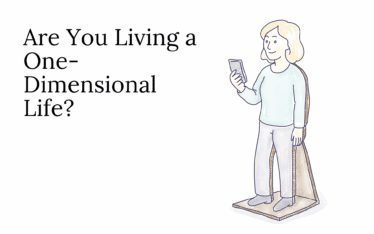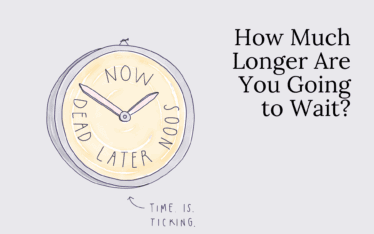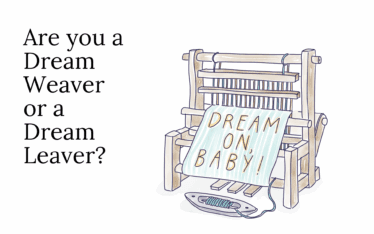What’s the worst thing your parents could’ve said to you while you were growing up?
A) “I’m so angry at you!!” (👈Said with the emphasis of two exclamation points.)
B) “I’m just so… disappointed in you.” (👈The word ‘disappointed’ pronounced with the inflection of italics.)
C) “Your father and I are going to have a family meeting alone in our bedroom for the next half hour.” (😳)
No one here isn’t shuddering at C—that’s the obvious correct answer.
Then, for most of us, it’s B.
Disappointing a parent, a boss, a coworker, the friend you threw a baby shower for (“oh, I guess I thought there were going to be more balloons…”)—it’s discomforting to let someone down, to burst their expectation bubble (er, balloon).
 But it might be even more unbearable to disappoint ourselves.
But it might be even more unbearable to disappoint ourselves.
“I’m not angry, I’m disappointed in myself”—that sentiment cuts deep to the bone… the very bone you’re supposed to be sucking the marrow of life out of.
Characterized by a niggling or gnawing (or downright gnashing) sense that “I could’ve done better,” disappointment highlights a discrepancy between an expectation you had for yourself and a reality that fell short.
Disappointment means we had a better idea for ourselves and then we promptly went and let ourselves down. We had hopes, dreams and ambitions, plans and goals, ideas and musings, and we either opted to defer them for an indeterminate time called “later,” or we abandoned them (RIP), or we half-assed them (in a sweet-but-sorrowfully vain effort to protect ourselves from an unsuccessful outcome—because it’s easier to say, “I didn’t really try all that hard” than “I gave it my all to start this Etsy shop and I now feel emotionally eviscerated because no one bought my garden gnomes”). It dismays me to even type these things.
For those of us with an appetite for self-actualization—the “Top o’ the Maslow Pyramid” types—we get the distinct pleasure of feeling disappointed with ourselves for being disappointed in ourselves. Disappointment squared! (Either that or we get that distressing ‘Circular reference’ warning in Excel that never ends well.)
Brief moment of clarification! I’m talking about the soul-pulverizing disappointment of the life we dreamed of and didn’t go after (at all or with reasonable gusto), not the letdowns of the inevitable crappy occurrences that that are a part of being alive. We can be disappointed in our fibromyalgia diagnosis, or the fact that we were laid off from a job we loved, or that the walls of our home are riddled with mold. That’s one branch of disappointment that I’m respectful of but not interested in right now for this conversation. Crap sandwiches will continue to be served on the platter of life and it’s our task—one of our many tasks in life—to figure out how to eat them.
I’m more concerned with the disappointments that we bring upon ourselves, that we’re at the epicenter of manufacturing. Disappointment is laced with regret. Regret has its own flavor of “Coulda Shoulda Woulda” that feels not-quite-debilitating, but just a little bit disabling to our souls. We can grind on for years with disappointment. Sometimes life appreciates when we hit rock bottom, though, because then we’re likelier to rise from the ashes (yes, like a glorious and resplendent Phoenix eager to tell its Story of Triumph). Problematically, the dull ache of disappointment might be more unbearable over time than the sharp spikes and barbs of momentary failure and rejection.
On that note, here’s (at least what I think is) a fascinating tidbit from psychology researchers: “Our findings concerning the experience of disappointment show that this experience, more than that of regret, involves feeling powerless, feeling a tendency to do nothing and to get away from the situation, actually turning away from the event, and wanting to do nothing. This suggests that the experience of disappointment can be more paralysing than that of regret.”
Disappointment actually disables us!
When we limp along with the aura of disappointment, things get tricky. We learn to live, we learn to fake-smile, we learn to accommodate, we learn to lie to ourselves about what our expectations really were in the first place, we learn to overcompensate using our other leg, and then over time, we’ve got a full body ache going on and a dizzying amount of chiropractic appointments.
Researchers see disappointment as “the emotional turbulence stemming from the thwarted hopes and dreams associated with unmet expectations.”
Should we talk more about the thwarting?
When we get to the bitter end—not to say the end has to be bitter (although morphine apparently does taste bitter… who knew?)—will we feel disappointed in our lives, or will we feel like we gave it a good old fashioned go? Trying and not succeeding has a different flavor than the disappointment of not trying at all.
- I know people who’ve felt disappointed they didn’t apply themselves more in school, disappointed that they didn’t go back to college to either finish a degree or learn something completely new that lit them up with astonishing aliveness.
- I know people who’ve felt disappointed they didn’t have the courage to go to couples counseling, or they were disappointed that after a bunch of couples counseling sessions that they just didn’t pull the plug and end the relationship that had flatlined in an honest effort to pursue love somewhere else.
- I know people who were disappointed they didn’t put themselves out there at work, that they didn’t offer their ideas more confidently in meetings, that they didn’t apply for the jobs they were interested in but a little too insecure to go for.
- I know people who’ve felt disappointed they didn’t spend more time exploring and living with spontaneity and having more fun. It’s all too easy to live a life where we work hard and feed off the fabulous high of achievement but end up living one-dimensionally, feeling like we missed out on the rapture of being alive.
- I know people disappointed they didn’t try to make their hobby a business, disappointed that they didn’t pursue a passion, or even make time in life to see what passion might even start to feel like.
- I know people who’ve felt disappointed they didn’t address some of the hardships that held them back… people who didn’t go to therapy to deal with their feelings about their mother, or that they didn’t go to rehab to deal with their alcoholism sooner, or that they didn’t go to a therapist to talk about their life-deflating-perfectionism until they were in their 60s.
We’re bound to disappoint mother-in-laws, micromanaging bosses, and passive-aggressive, ballon-loving friends. But life’s too short to disappoint ourselves.
What’s the opposite of disappointment?
The opposite of disappointment is satisfaction or delight—that warm, fizzy feeling (not necessarily accompanied by a glass of Prosecco) when reality meets or exceeds our hopes instead of letting them crash and burn.
How do we actually feel it?
The best we can do to live a life worth living is to somehow derail disappointment in our own lives… to de-disappointify… which requires a visit to the Disappointment Prevention Department.
At its core, the Disappointment Prevention Department’s strategic plan for satisfaction comes from four things:
#1: Forgive yourself for not crushing a goal you fell short of. You took your eye off the ball, and that’s okay, Slugger. “I never became a titan of industry… maybe it’s okay because I raised two kids currently without criminal records.”
#2: Decide if you want to ~do~ anything about your disappointment. If you’re licking your wounds about not making the bestseller list, for example, ask yourself if you’re even motivated to address the issue. Maybe the ship has sailed, so to speak—the idea of marketing your book deenergizes you and isn’t even an option in a life you’d like to be a part of. So let the disappointment go. If you are still interested in steering the ship, go buy some Dramamine and take the tiniest, most minute step forward you could take.
#3: Expectation management 101, or setting hopes that reality can actually reach or beat. (We’re looking for a realty-based recalibration of expectations, not a “You can’t be disappointed if you don’t expect anything” throwing in of the towel, of course.)
#4: Appreciation… noticing and savoring when things do go right, even if they aren’t perfect. It’s less about engineering big, dramatic successes and more about recognizing the little wins. It can be as small as, “Hey, my coffee didn’t taste burnt today,” or as big as, “Wow, that conversation went better than I rehearsed it in my head 19 times.”
It takes practice, though—our brains are wired to notice the bad stuff first (survival instincts and all). Feeling genuine delight often requires Prosecco pausing to catch the good moments before they slip away unnoticed.
Other feelings at the polar opposite of disappointment include feeling proud… feeling a sense of vitality… feeling like we participated. It also feels like we tried, even if it didn’t work out.
I’d be disappointed in myself if I didn’t keep sending messages out into the ether, writing these blog posts, gently-and-lovingly harassing people to pursue their dreams before they expire. I’d be disappointed in myself if I didn’t do all I could to get onto stages to wax on about this Anti-Disappointment Movement (which we really should design a cute logo for). I want us to wake up. I want us to not get to the end and feel like we led quiet lives of desperation, or that we even just led okay-ish lives where we let one dream die on the vine.
It’s never fun to let yourself down, to not reach your potential. Go de-disappointify your life today, my friend.

P.S.: You won’t be disappointed in my book, You Only Die Once: How to Make It to the End with No Regrets. I promise!
P.P.S.: Let’s connect on Instagram, okay?
P.P.P.S.: Oh and just in case you missed it… I’d love you forever if you took 16 minutes out of your life to watch my TEDx talk!






